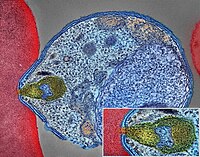
Photo from wikipedia
BACKGROUND A wide spread of chloroquine resistance prompted its discontinued use for treatment of uncomplicated malaria in several African countries. However, disappearances of chloroquine-resistant parasites have been reported in areas… Click to show full abstract
BACKGROUND A wide spread of chloroquine resistance prompted its discontinued use for treatment of uncomplicated malaria in several African countries. However, disappearances of chloroquine-resistant parasites have been reported in areas with restricted use of chloroquine. This review reports the current prevalence of chloroquine-resistant Plasmodium falciparum using Pfcrt K76T and Pfmdr1 N86Y genotypes. METHODS A PROSPERO registered systematic review searched evidence from PubMed/MEDLINE, Science Direct and Google Scholar. The search included studies on chloroquine-resistant/ susceptible P. falciparum in humans between January 1st, 2000 and May 15th, 2020. The search was conducted on 15th of May, 2020. RESULTS Out of 519 searched records, 15 studies qualified for final analysis with 8040 samples genotyped for Pfcrt K76T. Of 8040, 43.6% (837/1572; 95%CI: -0.9 to 88.1%) carried resistant genotypes versus 23.0% (1477/6468; 95%CI: 15.7-30.2%) while for 4698 samples analyzed for Pfmdr1 N86Y, 52.4% (592/1090; 95%CI: 42.3-62.5%) had resistant genotypes versus 25.9% (1314/3608; 95%CI: 5.8-46.0%), before and after chloroquine withdrawal, respectively. The median time since chloroquine withdrawal to data collection was 7.0 (interquartile range: 4.5-13.5) years. Low prevalence of resistant genotypes (Pfcrt K76T) was reported in Zambia (0%) in 2013, Malawi (0.1%) in 2009, Tanzania (0.2%) in 2018 and Madagascar (0.3%) in 2007 with significant variations in the included studies. CONCLUSIONS Chloroquine-resistant P. falciparum continues to disappear in countries with withdrawal of chloroquine. Areas with significant susceptible parasites, reintroduction of chloroquine can be considered, preferably in combination with other safe and affordable antimalarials.
Journal Title: Journal of infection and public health
Year Published: 2022
Link to full text (if available)
Share on Social Media: Sign Up to like & get
recommendations!